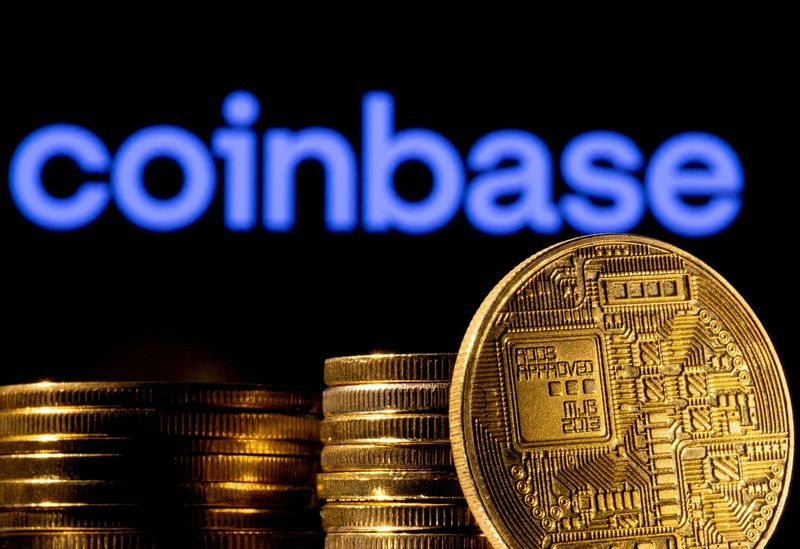By Jody Godoy
(Reuters) -Determining whether digital tokens are securities will be central to the high-stakes case brought by U.S. regulators alleging crypto platforms Coinbase (NASDAQ:COIN) and Binance violated the law by failing to register as a securities exchange, broker and clearing agency.
WHAT IS THE SEC ALLEGING?
The Securities and Exchange Commission (SEC) sued Coinbase on Tuesday in Manhattan federal court and accused the largest U.S. cryptocurrency platform of operating illegally by evading disclosure requirements.
The SEC said Coinbase allowed users to trade at least 13 crypto assets that should have been registered as securities, including tokens such as Solana, Cardano and Polygon.
The regulator is seeking financial penalties and wants a judge to order Coinbase to follow U.S. securities law.
While others, including the European Union, have started to craft regulation for the crypto industry, the U.S. has led a regulatory crackdown.
The SEC has brought more than a hundred enforcement actions in the past decade, claiming various cryptocurrencies are securities.
But the Coinbase case will be the biggest test yet of the regulator's jurisdiction over the industry.
The regulator this week also sued Binance, claiming the world's largest crypto exchange engaged in "an elaborate scheme to evade U.S. federal securities laws."
Coinbase has denied listing any securities. Binance has called the case disappointing and said it plans to defend against the claims.
Coinbase and other industry players have been adamant that most cryptocurrencies - which operate on a database shared across a network of computers, known as a blockchain - do not fit the definition of securities under U.S. law.
They have also called for new regulation or laws, saying the SEC has been vague and inconsistent in determining whether digital assets are securities and unhelpful to market participants seeking guidance.
WHAT IS A 'SECURITY' UNDER U.S. LAW?
To argue that crypto assets are securities, the SEC has relied on a U.S. Supreme Court case from 1946. The case dealt with investors in Florida orange groves owned by the W. J. Howey Co.
The court ruled that "an investment of money in a common enterprise with profits to come solely from the efforts of others," is a kind of security called an investment contract.
The SEC had jurisdiction to seek to prevent Howey from selling to out-of-state investors fractional land interests with a contract to provide profit from the harvest, the court said.
Securities, as opposed to other assets such as commodities, are strictly regulated and require detailed disclosures to inform investors of potential risks.
WHAT MAKES A CRYPTO ASSET A SECURITY?
Many of the SEC's crypto-related cases have ended in settlements, with companies paying fines and agreeing to follow U.S. law. In some cases, this has meant exiting the U.S. market or closing a cryptocurrency project.
In the few cases that have been decided in court, judges have agreed with the SEC that specific crypto assets are securities.
Those rulings said developers' statements tying the value of their digital assets to efforts to grow or maintain the associated blockchain systems showed that investor profits depended on the "efforts of others."
Courts have also decided that investors in those assets participated in a "common enterprise" because the funds they spent were pooled by the token issuer and used to develop relevant systems.
The SEC's case against Ripple Labs over XRP, currently the world's six-largest cryptocurrency, is likely to be the next case decided.
Ripple has said there was no common enterprise, since the blockchain associated with the cryptocurrency was fully operational before XRP was ever sold.
WHAT ABOUT BITCOIN?
Bitcoin is not considered a security because its anonymous and open-source origins mean investor profits are not dependent on the efforts of developers or managers, said Carol Goforth, a law professor at the University of Arkansas.
Some blockchain projects have tried to fund their operations in two stages, by offering securities under SEC regulations and later giving or selling those investors cryptocurrency after building a functional blockchain.
Goforth said the developers hoped that approach would remove the "comment enterprise" element, but she added the SEC has never clarified what it would take to convert a security to a non-security.
HOW WILL THE COINBASE CASE UNFOLD?
Coinbase CEO Brian Armstrong said on Twitter after the lawsuit was filed that the company is "proud to represent the industry in court to finally get some clarity around crypto rules."

But a ruling on the central issue could take years.
The Ripple case, which involves only one cryptocurrency, has taken two-and-a-half years to reach the point where a ruling is possible. The SEC has alleged in the Coinbase case that 13 different digital assets sold on the platform are securities.